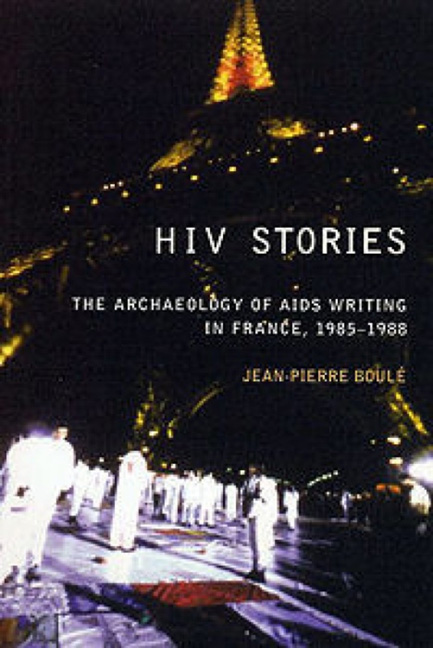5 - Dreuilhe: Metaphor/Phantasy and Mobilisation
from Part II - AIDS Testimony
Summary
Corps à corps, Journal de Sida, was published in France in 1987 by the prestigious publisher Gallimard in the series ‘Au vif du sujet’ (‘At the heart of the matter’) when Dreuilhe was 38. The book was published in North America in 1988. This text is characterised by what is referred to in the secondary literature as ‘the military metaphor’. Corps à corps has been caught up in the wider debate about the merits or drawbacks of using this metaphor for AIDS writing.
Let me start by describing the metaphoric texture of Corps à corps. AIDS is represented as World War Three, involving 165 countries (p. 28), compared to a tank destroying everything in its path, rolling over all the defences put up by modern medicine, ignoring any cry for mercy and oblivious to the crushing of the limbs it drives over (p. 42). Dreuilhe refers to himself as a civilian whose life was shattered when he was mobilised by AIDS (pp. 14–15). Lymphocytes are massed on the border while lavish pleasure (the pre-AIDS gay scene) has reduced the T4 cell count, the main defence of the Maginot Line. It all started with border skirmishes (flu, bronchitis) which were ignored (p. 23), as when the Popular Front in France ignored Hitler's intentions. The specificity of AIDS is that it reinvents guerrilla warfare, using psychological warfare (p. 137) and PWAs, if they are to stand a chance, must engage in this type of war (p. 17). The body is invaded by the HIV virus and the gay community is likened to Troy (pp. 143, 149), welcoming the fatal horse with open arms (the liberalisation of sexuality saw an increase in multiple sexual partners and unprotected sex, and hence facilitated HIV infection); indeed a whole section is entitled ‘Le cheval de Troie’ (pp. 36–54) (‘The Trojan Horse’). Medical treatment with AZT is likened to V-2 missile bombardments on the enemy (p. 40). The only difference between AIDS and war (though the narrator questions whether it is really a difference) is that PWAs are dying for no reason, whereas in war there is supposed to be a cause worth fighting for (p. 48).
Presented as an ‘AIDS diary’, Corps à corps is not a diary in the traditional sense of the term.
- Type
- Chapter
- Information
- HIV StoriesThe Archaeology of AIDS Writing in France, 1985–1988, pp. 120 - 141Publisher: Liverpool University PressPrint publication year: 2002

